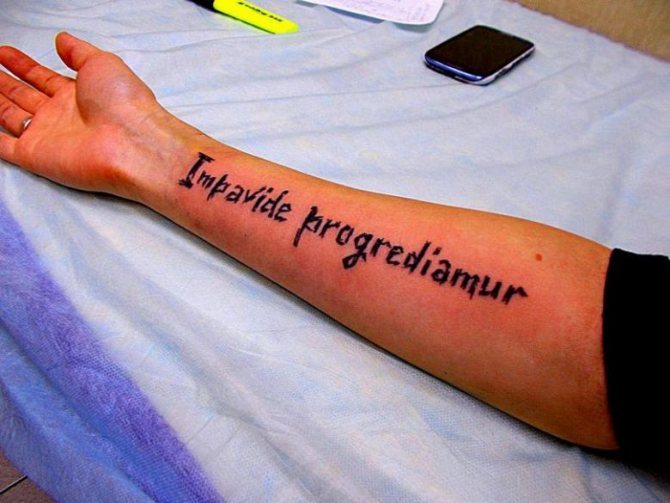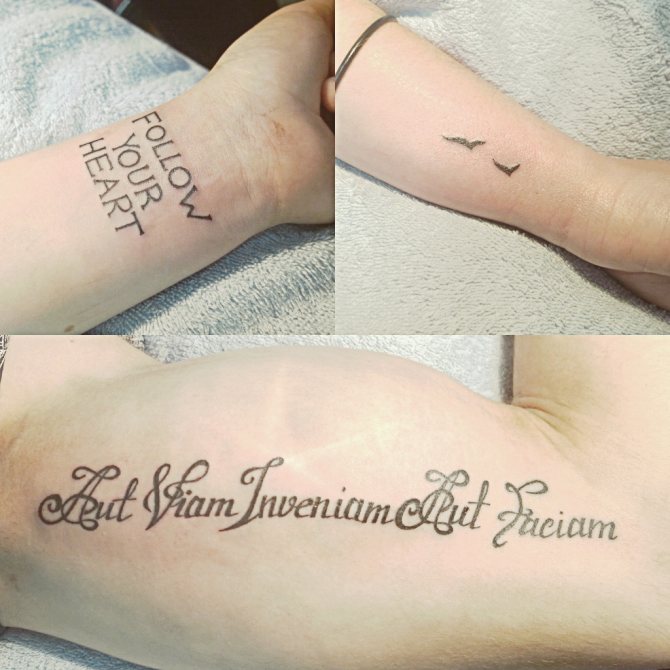« Veni, vidi, vici
» («
Came, saw, conquered
") is a Latin expression that anyone has ever heard of. It is attributed to Julius Caesar, who in 47 BC notified his friend Aminius in Rome of his quick victory at Zela over Pharnaces, son of Mithridates. Documentation of this event is found in Plutarch (an ancient Greek writer and philosopher and social activist) in his "Sayings of Kings and Commanders." And according to Suetonius, this phrase was carried before Caesar during his Pontic (third of five) triumph in Rome. By this Caesar was not celebrating the events of the war, as usual, but the swiftness of its conclusion.
But the headline was about the modern use of the phrase. And so, here we go!
Here's an example, In 2011, U.S. Secretary of State Hillary Clinton, in an address on the death of Muammar Gaddafi, spoke in a similar phrase, saying: "we came, we saw, he died."
.
And here we see that " Veni, vidi, vic
i" is used on the emblem of Marlborough cigarettes, produced by the Philip Morris tobacco company.
In music we can hear: at Jay-Z
in the song
Encore .
,
The Hives.
refers to the title of the album
Veni Vidi Vicious.
.
Peter Venkman, one of the main characters in the movie Ghostbusters, utters a humorous variation: " We came. We saw. We kicked his ass!
"
We came. We saw. We kicked its ass!
«).
I'm sure the list could go on and on. But we have named the most famous instances of use. If you liked this post, don't forget to subscribe and like it.
Veni, Vidi, Vici. Once upon a time the army of Pharnaces II, king of Pontus, positioned itself on a hill near the city of Zele. VENI (Arrived). Caesar, tired of waiting until Farnacus, unwilling to admit his defeat in the civil war, withdrew his army to Pontus and fulfilled the terms of the treaty, lost his patience and immediately joined his army with the remnants of the unit previously defeated by the intransigent king. VIDI (Seen). The great emperor, through the eyes of an experienced warrior, saw the neighboring hill left unattended by the Pontic army and occupied it, cutting off the enemy's escape route.
VICI (Victory).. After 4 hours of battle, the army of Pharnaces, trapped by Caesar's army in a narrow valley between the hills, turned to flight. "Veni, Vidi, Vici," Caesar wrote to the Roman Amantius. Three of these short words encapsulate the great talent of the commander and the victory that occupied a special place in the history of Rome. Modern man has supplemented this beautiful aphorism with the meanings of life, the desire for self-improvement and goal achievement.
Meaning of the tattoo Veni, Vidi, Vici
The tattoo "I Came, I Saw, I Conquered" is applied to the body of those who want to achieve the desired goal: to meet a new love instead of the lost one, to forget the pain of war, to overcome the fear of the obstacle that blocks the way to the goal. This aphorism is penned as an axiom of earthly existence: born, saw the world, passed away. It is written on the skin of winners, enjoying the result and planning the next step on the road to success: the businessman who made a lucrative deal, the athlete who won a competition.
Tattoo: Come, Seen, Won
Tattoo Veni, Vidi, Vici is used as a slogan bringing good luck and expressing life credo, warriors who came back alive from battle, travelers, gamblers, all those who seek to improve their lives and win a brilliant victory by investing their talent, luck and idea into it. This aphorism has meaning for the man who has found faith in his own strength by realizing the higher wisdom he lives by.
We all fight for something of our own, something that is foreign to others, that they will never appreciate. The Veni, Vidi, Vici tattoo symbolizes for such people the inner strength and desire to overcome all difficulties on the way to their goal. Compositions, in which the famous saying is inscribed, are quite rare. Additional elements of the figure in them are selected so as to strengthen or clarify the meaning of the aphorism.
Tattoo: Came, Seen, Won the shark and the lighthouse
For example, the emperor Julius Caesar is often depicted wearing a laurel wreath, demonstrating his power and achievements as a general. Therefore, as a complement to the tattoo Come, Seen, Won, Struck a laurel wreath of the victor. Inside it, the master of body painting sometimes draws an object that carries positive information about the area of life, the success in which the future owner of the tattoo wants to achieve.
Who is suitable for whom?
Purposeful men, choose for themselves the tattoo Veni, Vidi, Vici, embossed in Gothic, Roman or print font more often in Chicano, Realism styles. That the inscription is easily readable, the font chosen is not too bold. The wise utterance in Latin, not everyone can understand, allows the man to stand out from the crowd, gives him some mystery.
Tattoo sword and inscription.
Girls for whom the tattoo Veni, Vidi, Vici defines originality, rebelliousness, freedom and disarming effect of their beauty on men, prefer ornate multicolored inscriptions or put the aphorism in italics. A tattoo done in white paint looks especially spectacular.
Winged expression - Came, Seen, Won: whose words, who said them, who is the author of the words?
The history of the origin of the phrase is very interesting. If we believe the records of the great historian Plutarch, the first prominent person who used this phrase was the emperor Julius Caesar. It happened literally in 47 B.C.
Caesar wrote a letter to his friend in which he described his victory over King Pharnaces. He signed the letter with a short phrase that, in his opinion, most accurately characterized the entire fight: "I came, I saw, I conquered. These words were later inscribed on the plaque (a symbolic shield) that headed the triumphal parade.
The brilliant utterance of the brilliant man was.
"Veni vidi vici" is not bragging; it is a statement of an easy, brilliant and very meaningful victory--"Came, saw, conquered." Naturally, the phrase went viral and, according to historian Suetonius, author of The Life of the Twelve Caesars, it was inscribed on a banner carried in front of Gaius Julius as his victorious army entered Rome. Mountains of literature have been written about Caesar, his popularity is not diminished, but increased through film and salad. He is quoted because the phrase "Veni vidi vici" is not the only expression that has gone down in history. But it has become the exact iconic name for everything that is done on time, brilliantly, without a hitch. And, of course, it, so beautiful, is used as a slogan on the emblems of various firms, the most famous of which is tobacco . The words adorn packets of Marlboro cigarettes.
Julius Caesar was the author of so many phrases - clever, prophetic, cynical. He said that one must not offend guests, that every man is the master of his own destiny, that he, Caesar, did not care whether they hated him or not, as long as they feared him. Dozens of sayings have been left to posterity, but "I came, I saw, I conquered" is a saying that announces itself. Once you read it, you are captivated, and you realize that no one has ever been more precise, cleverer, or more elegant in declaring victory.
Gaius Julius Caesar
Gaius Julius Caesar was one of the noble patricians - the patrimonial aristocrats whose ancestors stood at the foundation of Rome. His lineage was considered one of the most ancient. With his keen intellect, vast knowledge, and talent as a military leader, Caesar was able to attract the attention and love of the people from a young age. As leader of an army he completed the conquest of Gaul, led two campaigns to the island of Britain, and, defeating rivals one by one, established himself as dictator.
The struggle for power led to a civil war between the supporters of Caesar and Pompey, the ambitious Roman consul. The struggle went on for four years and encompassed almost all the provinces of the country. Legions loyal to the senate fought against Caesar's forces throughout the Roman republic. Battles were fought throughout the territory:
When the struggle spilled over into Africa, Pompey was assassinated. While in Egypt, the dictator learned that the Pontic king Pharnaces II, a long-time foe of the Romans, had opposed Rome. Pharnaces' army invaded the empire's possessions in Asia, destroying garrisons and killing inhabitants. Caesar rushed to the aid of the outskirts of the state, which had been left unprotected. In addition to the military component of this campaign, there was also a political one. The people were tired of the conflict, revolt was brewing, and Caesar badly needed "a small victorious war" to come to Rome as a triumphant.
The events leading up to the phrase
Caesar was not having the best time of his career. The huge, well-armed army of Pharnaces, son of the defeated Roman dictator Mithridates, landed in Asia Minor and began to win one victory after another. The son avenged his father. Julius Caesar could not return to Italy, where urgent matters called him, leaving everything as it was. And so in 47, at the end of the summer, at the town of Zele, led by a brilliant commander troops completely defeated the army of Farnacus. Victory was easy and swift, Caesar returned to Rome a triumphant. He immortalized this brilliant event with a letter to his friend Aminius, in which this phrase was written.
Came, Seen, Conquered - what does it mean: the meaning of the phraseology
It is worth noting that the phrase "Veni, Vidi, Vici" or "Came, Seen, Won" is quite strong not only on the energy level, but also in the verbal sense. It is quite difficult for an ordinary person to feel these words completely, for that one should be a great military leader or at least a military man.
In today's world this phrase is found in all areas of human activity: athletes utter it after winning a competition, businessmen after a successful deal, and ladies' man after winning another girl. The phrase literally denotes the simplicity and success of the accomplished deed: "decided, did it, got better."
How to understand the phrase correctly?
Places to apply.
The specific place for padding the tattoo inscription in Latin depends on the shape and size of the text, as well as the meaning of the phrase itself. Agree, a serious postulate can not be perceived if it is printed on an inappropriate part of the body. If the line is long, it can be beautifully placed along the collarbones, on the arm along the length of the forearm.

A small saying in small print can be successfully placed on the foot, wrist, shoulder or shoulder blade. A short motto looks beautiful, inscribed in the middle of the back, between the shoulder blades, on the spine. And it is equally successful for both the male and female body.


If the tattoo inscription in Latin is volumetric, it will look good on the back, under the ribs, on the shoulder. Also in vogue now are half inscriptions broken into two parts. One part of the phrase is printed on the right hand and the other on the left hand. Or the whole is printed on different legs, sides of the chest or back. If the hands are combined, the whole tattoo inscription in Latin will reveal the essence of the message.


The choice of location for the tattoo should be done very wisely. Not only will the picture will last a lifetime, the phrase can be a source of trouble if misinterpreted in some circles. If this is not just a drawing, but a real motivating amulet, it is better not to place it in a prominent place. Let the talisman in the form of a tattoo inscription in Latin motivates in a secret place, not dissolving the energy of magical words.


Also, you must remember that in the area of the abdomen, chest, thighs the skin tends to stretch and spoil the drawing. And the skin in the wrist area is particularly vulnerable, all the inscriptions on it will wear off faster, fade and require correction.


After the battle.
Caesar's supporters did their best to make the short phrase widely known among the people. When the triumphant returned to the capital, the phrase that had already become a winged phrase "veni, vidi, vici" was engraved across the field of the shield carried during the commander's triumphant entry into Rome. He regained his fame and popularity, established a strict order in the Eternal City, pacified the discontented and continued to strengthen his dictatorial powers.
The great Roman was bathed in the rays of glory during his lifetime and was revered after his death. And even his very death gave rise to another famous aphorism. Gaius Julius Caesar was the victim of a conspiracy, having managed to carry out many reforms in a short time. Caesar's name is derived from the titles of king, Caesar, Kaiser, and the month of July.
And the phrase from Matthias' letter has remained for centuries a symbol of decisive action that led to quick success. It can be seen as an element of brand names, a symbol of organizations and societies, and it is often used in tattoo art. Rarely has anyone not encountered or applied this wonderful aphorism. The ancient, almost forgotten Latin is still alive today. They don't need a translation, just as no guide is needed beside a portrait of Gioconda or an entertainer at Swan Lake.
Phrase-Pearl
First and foremost among such quotations are the greeting "Ave!" and the sacramental "Veni, vidi, vici." Dictionaries and reference books rely on the testimonies of Greek and Roman philosophers and historians, such as Plutarch's "Sayings of Kings and Commanders," from which the phrase was derived. The high culture of the ancient Mediterranean, the "cradle of civilization," is laden with beautiful legends. Famous kings and generals who were intelligent and educated are attributed bright sayings, and if they are not long and beautiful, they are capacious, short and precise.
The phrase "Veni vidi vici" belongs to Gaius Julius Caesar (100-44 B.C.). It meets all standards of historical catchphrases - elegant in style and appearance, clever and, most importantly, it was fully in keeping with the events of the time.
Veni, vidi, vici
Caesar's in Egypt had only a thousand soldiers, but at the end of the summer the good news reached Rome: the arrogant Pharnaces, son of Mithridates, who had so frightened the Eternal City 20 years before, was defeated and fled into the wild steppes of Scythia. It became known that a Roman citizen, Matius, received a letter from Caesar with only three words: "veni, vidi, vici." "I came, I saw, I conquered" in Latin.
What was behind this message? It is known that the Roman detachment traveled a great distance at lightning speed to join its comrades, previously defeated by Pharnaces. The legion's swiftness and organization gave birth to the first word of the winged phrase - veni. The opposing armies converged on the Pontic fortress of Zela.
In the science of war there is such a concept as "evaluation of the situation": the commander calculates the enemy's weaknesses and strengths, its armament, fighting spirit, the terrain on which his soldiers will have to fight. The commander must see the battlefield through the eyes of the warrior. And Caesar did. Literally: the Pontic infantrymen, having occupied the dominant height, left the neighboring hill unattended. At night the Romans climbed it and began to prepare fortifications. Farnacus was now unable to retreat and could not use his main weapons - chariots and heavy cavalry. Caesar's commanding talent gave a second word - vidi.
The word Vici in Latin means victory. Despite the fact that the Roman legions were lined up on the slope of a high hill, Farnacus decided to defeat them. The Pontians led the attack along a steep ridge. They succeeded in pinning their enemy to a fortified camp, where a fierce battle ensued.
For a long time it was impossible to say who would have the battlefield. It even seemed that the army of Farnacus was defeating the Romans. But the veterans of the VI Legion, holding the right flank, overturned the attackers and turned them to flight. The Pontians were only able to delay the enemy, giving their king an opportunity to leave the scene of the battle. The combination of the bravery and skill of the legionaries, with the talent of their commander, made up the last part of the slogan veni, vidi, vici - victorious, victorious, vici…
The following factors accounted for the success of the Roman legions:
- The presence of experienced "veterans" who turned the tide of the battle.
- The successful position chosen by the commander.
- Confusion in the enemy camp, intensified as a result of crushing in a narrow space.



































